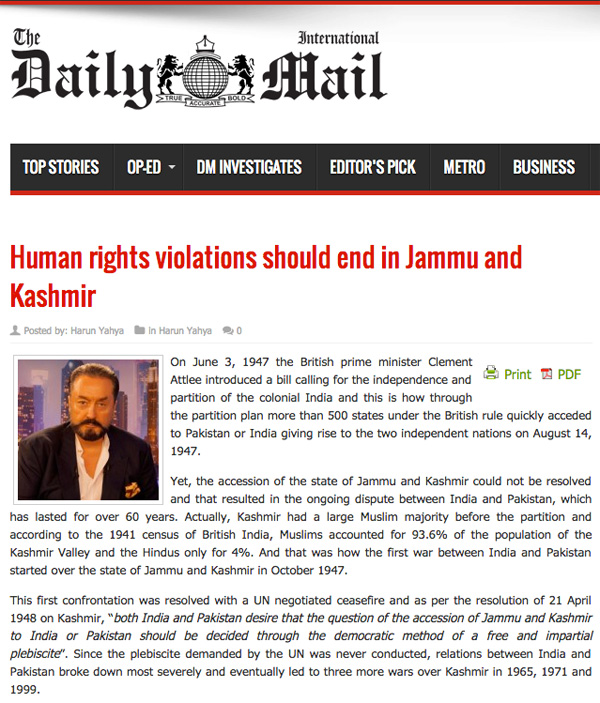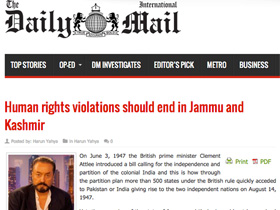
On June 3, 1947 the British prime minister Clement Attlee introduced a bill calling for the independence and partition of the colonial India and this is how through the partition plan more than 500 states under the British rule quickly acceded to Pakistan or India giving rise to the two independent nations on August 14, 1947.
Yet, the accession of the state of Jammu and Kashmir could not be resolved and that resulted in the ongoing dispute between India and Pakistan, which has lasted for over 60 years. Actually, Kashmir had a large Muslim majority before the partition and according to the 1941 census of British India, Muslims accounted for 93.6% of the population of the Kashmir Valley and the Hindus only for 4%. And that was how the first war between India and Pakistan started over the state of Jammu and Kashmir in October 1947.
This first confrontation was resolved with a UN negotiated ceasefire and as per the resolution of 21 April 1948 on Kashmir, “both India and Pakistan desire that the question of the accession of Jammu and Kashmir to India or Pakistan should be decided through the democratic method of a free and impartial plebiscite”. Since the plebiscite demanded by the UN was never conducted, relations between India and Pakistan broke down most severely and eventually led to three more wars over Kashmir in 1965, 1971 and 1999.
In its current status Kashmir, the region surrounded by the borders of India, Pakistan and China is one third administered by Pakistan, known as Azad Kashmir covering northern areas now Gilgit – Baltistan; two-thirds controlled by India, known as the state of Jammu and Kashmir including Ladakh, Jammu and the valley of Kashmir. In fact, Jammu and Kashmir is the only state in India that has a Muslim majority population as Islam is practiced by about 67% of the population of the state.
The ongoing dispute resulted in grave atrocities harming the lives of the innocent women, men and children and it is estimated that there have been 70,000 dead, and 10,000 disappearances during the past 25 years of the conflict. In the Himalaya region only 37 percent of the 200,000 orphans are said to have been orphaned in the dispute according to a study conducted by Save the Children, a UK-based NGO. And the persecution of Muslims is again evident through an investigation carried out on 38 sites in India’s state of Jammu and Kashmir where 2,730 unmarked graves were discovered as proof of the missing thousands of Kashmiris. These suggest the possibility of mass murder, and there is an urgent requirement for an independent investigation to be carried out by international bodies, mainly the UN, in regard to the allegations of these unlawful killings, extrajudicial executions and enforced disappearances of Muslims in the state of Jammu and Kashmir. It is not possible to speak about democracy in India when there are such instances in violation of the right to life, the right to liberty and security of individuals.
What is more, Muslim population of the Jammu and Kashmir is also facing a Maoist insurgency, which in 2011 was active in nearly 80 districts across 11 Indian states. The villagers are forced between state security forces and Maoist rebels, since Maoists frequently demand shelter and information from villagers, who are later on punished by security forces for collaborating with the rebels. It is obvious under these circumstances, Muslims are held under duress, ceaselessly attacked and assaulted by different parties because of crimes they have not committed and on this grounds, cannot have a normal way of living in their towns. There are cases documented where Maoists even recruit children into their forces and attack schools, which again puts students at risk.
There are also other horrifying sceneries in detention centers throughout Jammu and Kashmir governed by the Indian government. An estimated 700,000 military and paramilitary forces with one soldier for every 17 civilians are deployed in the region. In fact, the International Committee of the Red Cross documented in 2005 that “electrocution, beatings and sexual humiliation are used routinely” by such personnel. The ICRC staff told the US diplomats they had made 177 visits to detention centers in Jammu and Kashmir and had met 1,491 detainees who reported ill-treatment, and being subjected to one or more of six forms of torture. In the background of this violence lies the Armed Forces Special Powers Act (AFSPA) imposed in 1958 providing the army and paramilitaries in India with almost total impunity. This way persecution against Muslims is carried out under the guise of security and people are arrested without a warrant and on mere suspicion.
This general perspective bringing only some few facts under light is adequate to see that Muslims are passing through human rights violations and harassment in the state of Jammu and Kashmir, the land where they have been living since the 14th century. Muslims with their morals of love and compassion, self-giving and perseverance are very worthy and highly esteemed persons and they have been rooted in the region with their religion, culture and benevolence. India will only be a true democracy when it stops the unlawfulness, misconduct and ill treatment that Muslims are subjected to and corrects its past errors by removing the oppression from over every individual who resides under its governance.
Adnan Oktar's piece on Daily Mail:
http://dailymailnews.com/2015/01/08/human-rights-violations-should-end-in-jammu-and-kashmir-2/


